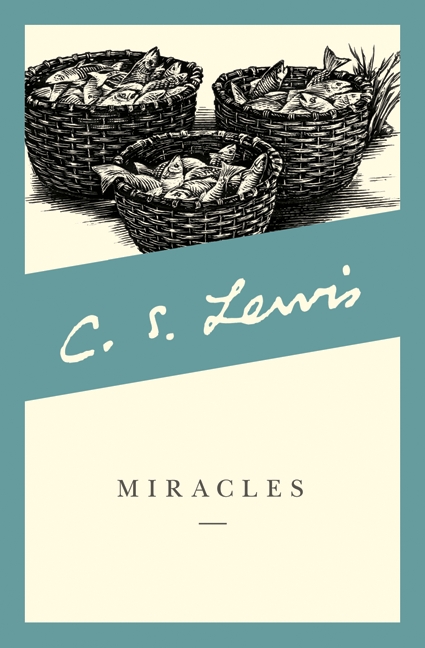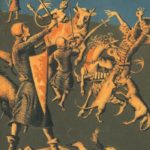The Words Of C. S. Lewis
 On November 22, fifty years ago, C. S. Lewis passed away. While we at Spec Faith certainly have never ignored this great Christian thinker, apologist, and speculative writer, it still seems appropriate to focus on him this month as a tribute. The thing is, the best tribute I can envision is to give his words a platform.
On November 22, fifty years ago, C. S. Lewis passed away. While we at Spec Faith certainly have never ignored this great Christian thinker, apologist, and speculative writer, it still seems appropriate to focus on him this month as a tribute. The thing is, the best tribute I can envision is to give his words a platform.
I’ve chosen a portion from his book Miracles, which might seem surprising. However, in this excerpt, Lewis divulges what he believes about myth, or more accurately, what he believes about Jesus.
Confused? See, this is why I need Lewis’s words to stand on their own. He says it so much better than I ever could.
This passage comes from the chapter “The Grand Miracle,” in which he states, “The central miracle asserted by Christians is the Incarnation.” He describes how God coming down only to ascend is perfectly shown in nature, and the likeness of the two is a unifying principle to give validity to the Incarnation.
He then raises the question that perhaps the Incarnation fits too perfectly into this nature cycle–that some might think it is merely the creation of one more nature religion with a “corn king” who dies and revives year after year. And then this excerpt:
There is, however, one hypothesis which, if accepted makes everything easy and coherent. The Christians are not claiming that simply “God” was incarnate in Jesus. They are claiming that the one true God is He whom the Jews worshipped as Jahweh, and that it is He who has descended. Now the double character of Jahweh is this. On the one hand He is the God of Nature, her glad Creator. It is He who sends rain into the furrows till the valleys stand so thick with corn that they laugh and sing. The trees of the wood rejoice before Him and His voice causes the wild deer to bring forth their young. He is the God of wheat and wine and oil. In that respect He is constantly doing all the things that Nature Gods do: He is Bacchus, Venus, Ceres all rolled into one. There is no trace in Judaism of the idea found in some pessimistic and Pantheistic religions that Nature is some kind of illusion or disaster, that finite existence is in itself an evil and that the cure lies in the relapse of all things into God. Compared with such anti-natural conceptions Jahweh might almost be mistaken for a Nature-God.
On the other hand, Jahweh is clearly not a Nature-God. He does not die and come to life each year as a true Corn-king should. He may give wine and fertility, but must not be worshipped with Bacchanalian or aphrodisiac rites. He is not the soul of Nature nor of any part of Nature. He inhabits eternity: He dwells in the high and holy place: heaven is His throne, not His vehicle, earth is His footstool, not His vesture. One day He will dismantle both and make a new heaven and earth. He is not to be identified even with the “divine spark” in man. He is “God and not man”: His thoughts are not our thoughts: all our righteousness is filthy rags. His appearance to Ezekiel is attended with imagery that does not borrow from Nature but (it is a mystery too seldom noticed) from those machines which men were to make centuries after Ezekiel’s death. The prophet saw something suspiciously like a dynamo.
Jahweh is neither the soul of Nature nor her enemy. She is neither His body nor a declension and falling away from Him. She is His creature. He is not a nature-God, but the God of Nature–her inventor, maker, owner, and controller (pp 114-115).
As a refresher, here’s the imagery not borrowed from Nature which Lewis referred to:
Then I looked, and behold, four wheels beside the cherubim, one wheel beside each cherub; and the appearance of the wheels was like the gleam of a Tarshish stone. As for their appearance, all four of them had the same likeness, as if one wheel were within another wheel. When they moved, they went in any of their four directions without turning as they went; but they followed in the direction which they faced, without turning as they went. Their whole body, their backs, their hands, their wings and the wheels were full of eyes all around, the wheels belonging to all four of them. The wheels were called in my hearing, the whirling wheels. (Ezekiel 10:9-13)
But what does all this have to do with Lewis’s belief about myth? From Miracles again:
Now this brings us to the oddest thing about Christianity. In a sense the view which I have just described is actually true. From a certain point of view Christ is “the same sort of thing” as Adonis or Osiris (always, of course, waiving the fact that they lived nobody knows where or when, while He was executed by a Roman magistrate we know in a year which can be roughly dated) [p 113] . . . Now if there is such a God and if He descends to rise again, then we can understand why Christ is at once so like the Corn-King and so silent about him. He is like the Corn-King because the Corn-King is a portrait of Him. The Corn-King is derived (through human imagination) from the facts of Nature, and the facts of nature from her Creator; the Death and Re-birth pattern is in her because it was first in Him (p 115).
In summation, Lewis believes myth, through the agency of man’s imagination, sprang from God by way of Creation which mirrors Him.
Stories, we can conclude, may falsify the true image of God because they are constructs of human imagination, and yet they retain shadows of reality, some with more clarity than others, and Lewis’s, I would suggest, most of all.





































Lewis says it so well that there’s nothing else to say
Julie, I agree. Lewis was such a good thinker, but he had the knack of breaking down big ideas and making them accessible to ordinary people. It’s next to impossible to improve on what he had to say.
Becky
Aw, I love you, Lewis, but Imma quibble with you.
I’m pretty sure he addressed this elsewhere, but it’s hard to call the corn/Fisher King gods copies when a good deal of them existed before Christianity had spread to the particular region. The Fisher King himself was Celtic in origin, and while we don’t have a good handle on the details of that mythos, it’s unlikely that it was heavily influenced by Christianity. We all know Baal and Ishtar and Osiris were pre-Jesus. Maybe you can say that they are copies in spirit, but that’s reaching a bit.
I don’t think Lewis intended to imply that they were literal copies. Rather, they’re generalized human expressions of the universal, divine truth that was wholly realized in the life of Christ.
Oh, probably. But I don’t find it entirely easy to reconcile that cyclical motif and its idiosyncrasies in the individual myths with capital-T Truth. It feels a little too apples and oranges and baseballs sometimes.
Can’t resist the urge to make the reference when the Fisher King is under discussion, here’s TS Eliot’s “The Waste Land”: http://www.bartleby.com/201/1.html
That’s probably because we amateur Christian myth fans go way overboard in simplistically labeling everything as redemption theme or a Christ-figure. We shouldn’t retroactively interpret myth to fit the historical facts of the Gospel. Many of those ancient myths probably contain elements that can’t and shouldn’t be mapped to the Christian version of the cyclical motif.
Still, patterns mean something. It’s human nature to look for meaning in recurring patterns. And I think Christianity does set out to explain — if not necessarily to assimilate — the essence of the cyclical myth. The paradox of death being necessary for new life is part of the deepest core of Christianity, and the Gospel claims that Jesus embodied the ultimate representation of this all-important truth.